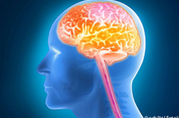The latest treatment for brain tumors

Thanks to highly advanced methods, many brain tumors can be successfully treated today.
Every year more than 8,000 people in Germany are diagnosed with a primary brain tumor. It can strike anyone, with equal likelihood, because there are hardly any risk factors that promote the tumor. About two percent of all cancers are tumors of the brain and spine, so they are relatively rare. Moreover, doctors divide the disease into 130 subtypes. These differ mainly in which type of cell is pathologically altered and in what area of the brain the tumor occurs. Therefore, diagnosis and treatment depends largely on the doctors' experience in order to correctly recognize unusual types of tumors. "Some brain tumors occur so infrequently that many doctors see them only once or twice in their careers," says Professor Dr. Anca-Ligia Grosu, Medical Director of the Department of Radiation Oncology at the Medical Center - University of Freiburg.
Correct diagnosis requires considerable experience
In order to combine knowledge and experience via close cooperation between specialists of different departments, the Neuro Oncology Center was founded at the Medical Center - University of Freiburg. "The Neuro Oncology Center in Freiburg is a top site in Germany and internationally for brain tumor patients. As a certified center we treat a large number of patients with brain tumors, which further increases our experience," says Professor Grosu, spokeswoman for the Center.
Men are affected somewhat more often than women, however individual subtypes can also occur more strongly in women. Generally, brain tumors can appear at any age, but are more frequently diagnosed but in people between 50 and 70 years old. Primary brain tumors occur when the cells originate directly in the brain, and do not arise from metastases.
Symptoms range from headaches to personality changes
Signs of a brain tumor can be severe headaches, nausea, speech and visual disorders, seizures and even personality changes. "If these symptoms occur suddenly and for no apparent reason, a doctor should be consulted as soon as possible for further clarification," says Professor Grosu. Further symptoms are highly dependent on the area of the brain affected.
The physical symptoms are often accompanied by fears in those affected and their families: fear of personality changes and of losing decision-making and self-determination abilities. "Sufferers often withdraw from society. By educating people about the disease, we hope to improve the situation for those affected and their families," says Professor Grosu.
Evidence of tumors can in general be reliably detected using imaging techniques such as magnetic resonance imaging (MRI), positron emission tomography (PET) or computed tomography (CT). A tissue sample and subsequent molecular biological examination can bring certitude as to the type of tumor.
Surgery, radiation and chemotherapy are the main pillars of treatment
In two out of three cases, the tumor is benign. That is, it grows relatively slowly and does not invade the surrounding tissue. Then an operation is often the only treatment necessary, and the patient has a good chance of a complete cure. "Many patients don't know that although a brain tumor is dangerous, it can often be treated very successfully," says Professor Grosu.
If due to its location the tumor cannot be completely removed surgically, or there is a risk of cancer cells remaining in the brain, doctors frequently employ high-precision radiation therapy. "We are now in a position to irradiate brain tumors down to the millimeter, thus destroying or at least stopping them," says Professor Grosu. The latest equipment is used at the Medical Center - University of Freiburg, displaying the tumor live and in three dimensions, thus allowing extremely precise irradiation.
Chemotherapy is the third important pillar in the treatment of brain tumors. The different therapeutic methods are often combined in order to achieve the maximum effect. In addition, a number of clinical studies on new therapeutic approaches are being carried out at the Medical Center - University of Freiburg, which can benefit patients.
Back